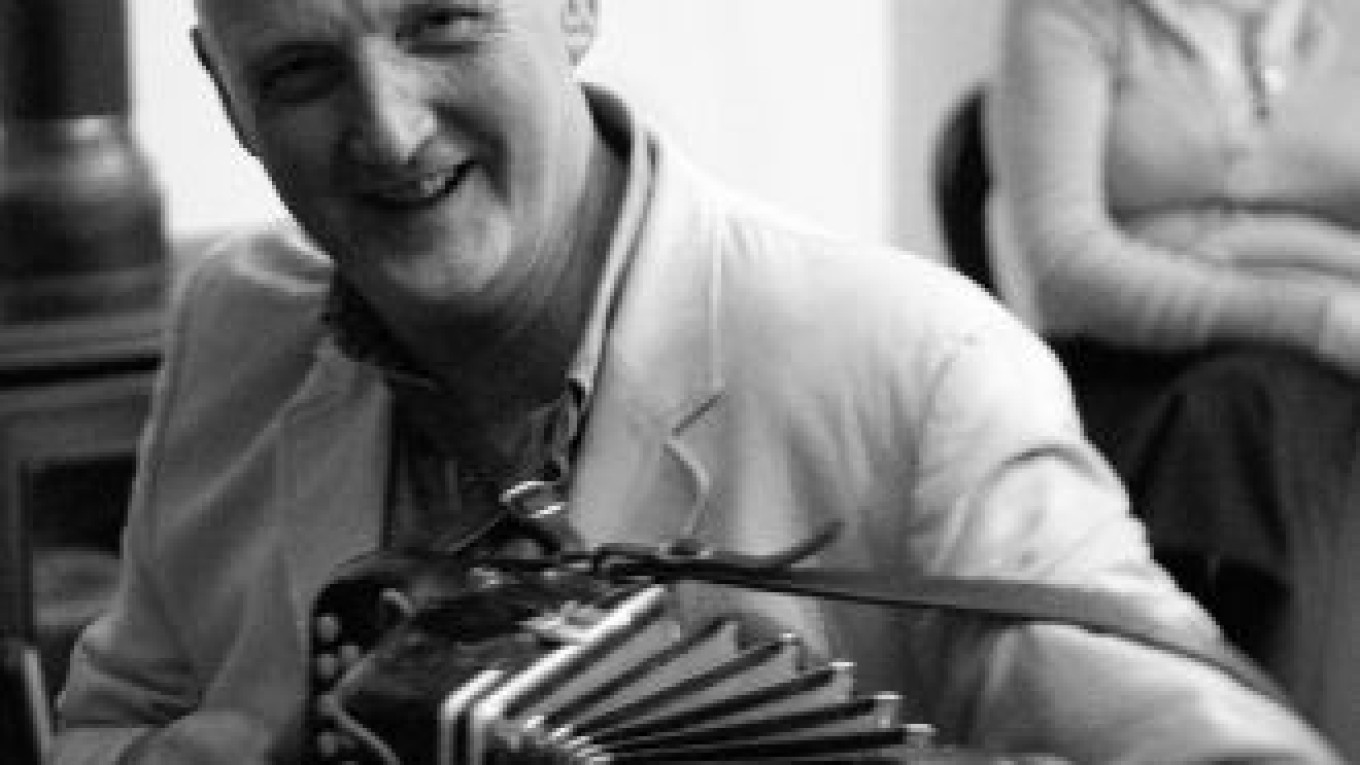Ireland may be on its knees economically but remains firmly on its feet in cultural terms. A sea of Irish music and dance is sweeping the world, and one of the tidal waves in this Irish cultural storm will break land in Moscow this weekend with the arrival of musical legend Breanndan Begley and his sons.
A virtuoso Irish button-accordion player as well as singer and step dancer from a family with siblings of no less talent, he’s a superstar in the traditional music world of his native land.
On his first visit since the Soviet 1980s, he’s in for a shock at the transformation — not in terms of the obvious, but more the extraordinary Irish music and dance scene in Moscow. Scores of Russian musicians have embraced the music of the other extremity of Europe. Thousands have learned to dance in various Irish forms through a host of schools across the capital and in other Russian cities, too.
Regular sessions take place here, with club Vermel last week aswirl with set dancing, the floor pounding to music from a furious forest of fiddle bows and flutes blasting out Irish tunes in the corner, with barely an expat in sight.
“I’ve heard there are great things going on in Moscow. I can’t wait to see for myself and am really looking forward to playing. It will be a positive culture shock. Given the Russians’ amazingly rich tradition and excellence in music and dance, if they’re taking on our culture, it will be great for Irish music,” Begley said in an interview.
“I guess Irish musicians have been kind of cultural ambassadors for our country. But in a week when we’ve uncovered the biggest financial hole our country has ever faced, it’s almost humbling to see how our culture is loved across the world. And it’s great to see how the Russians are making their own of our music and dance,” he said.
The Celtic Tiger — Ireland’s economic boom of the last decade now painfully seen as a credit-fueled fantasy as fictional as any piece of the country’s rich tapestry of mythology — has had varied impacts on its culture. At one extreme it brought an alien vulgarity, but the decade of now-distant prosperity also brought new performance venues built across the land for a nation awash with musical talent to perform in. Festivals and music classes flourished too, with the strange modern world of mad money sending some to seek even harder their traditions through music and dance.
But the end of the boom has made the culture even stronger, Begley said. “Ireland is still the great country it was before. Since the recession, it’s like people are coming to their senses. When there’s less work and money around, they’re turning to the music too now,” he said.
Recession, a smoking ban and a clampdown on drunk driving in the mainly rural country have seen emptying bars struggle or shut down. “There are less gigs now in pubs, but instead we have the legacy of the boom with concerts in the new theaters and venues. And there’s huge interest with great crowds,” Begley said.
Begley’s fame extends at home and abroad, be it as a television host of a traditional music program in his first language, Irish, or as a performer. He tours widely, almost a missionary for his culture.
“Irish music no longer belongs just to Ireland, it’s now found all around the world. People don’t necessarily want to be Irish — they just love the music, it says something to them. Some people are into yoga or karate — and some are into Irish music,” he said.
Begley’s stature is such that musical and dance pilgrims are trekking from as far away as Kiev, Nizhny Novgorod and St. Petersburg for his performances, with his sons Breanainn on guitar and Cormac on concertina. Their appearance will provide spectacular evidence of this remarkable organic cultural fusion between East and West.
“The merry love the fiddle and the merry love to dance,” wrote Ireland’s greatest English-language poet W.B. Yeats. While the fiddling’s at an end for Ireland’s bankers and landlords, the music and dance merely picks up pace for its people in hard times — and their tradition’s brethren in faraway Moscow.
Breanndan Begley and his sons play Saturday at 2 p.m. at a ceili at Dom. 24 Bolshoi Ovchinnikovsky Pereulok, Bldg. 4. Metro Novokuznetskaya. Tel. 953-7236. They play Sunday at 8 p.m. at B2. 8 Bolshaya Sadovaya Ulitsa. Metro Mayakovskaya. Tel. 650-9918.
A Message from The Moscow Times:
Dear readers,
We are facing unprecedented challenges. Russia's Prosecutor General's Office has designated The Moscow Times as an "undesirable" organization, criminalizing our work and putting our staff at risk of prosecution. This follows our earlier unjust labeling as a "foreign agent."
These actions are direct attempts to silence independent journalism in Russia. The authorities claim our work "discredits the decisions of the Russian leadership." We see things differently: we strive to provide accurate, unbiased reporting on Russia.
We, the journalists of The Moscow Times, refuse to be silenced. But to continue our work, we need your help.
Your support, no matter how small, makes a world of difference. If you can, please support us monthly starting from just $2. It's quick to set up, and every contribution makes a significant impact.
By supporting The Moscow Times, you're defending open, independent journalism in the face of repression. Thank you for standing with us.
Remind me later.


